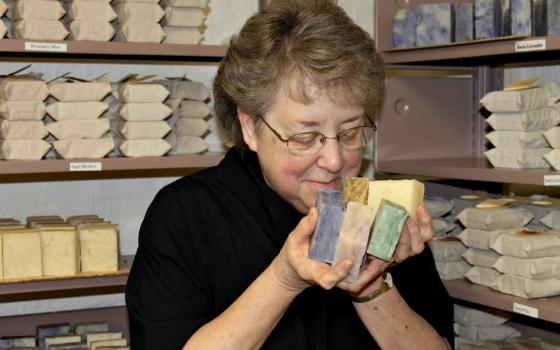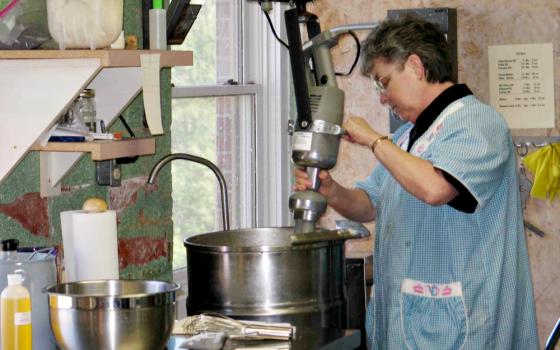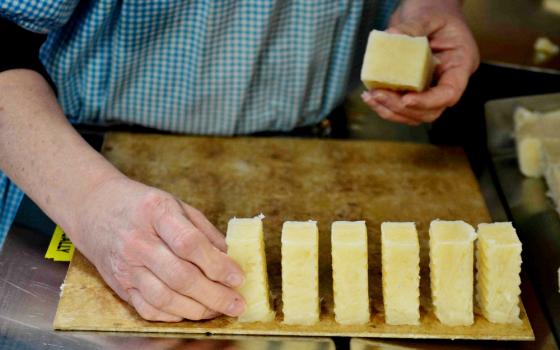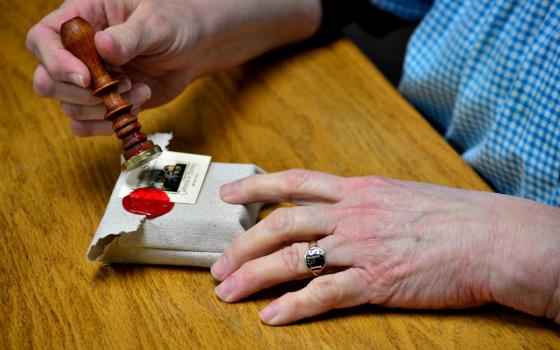St. Benedict taught that those living the monastic life should live by the work of their hands. That's just fine with Sr. Cathleen Marie Timberlake of the Benedictine Sisters of Perpetual Adoration.
Timberlake has always liked to make things, and in her nearly 50 years since she joined the congregation in Clyde, Missouri, she has made items such as drums, candles and soap.
But it's the soap that has stuck with her, so much so that she's now known as "the Soap Sister."
Timberlake has made premium handmade soap for 17 years, and as they have grown in popularity, her production has increased to more than 20,000 bars of soap a year. The monastery sells the soap and other handmade products online, but most of its sales are through its store at the monastery.
GSR: How did you become "the Soap Sister"?
Timberlake: I've always done artsy-craftsy sorts of things. But the soap-making, it just kind of stuck. It continues to be a way to let people know who we are, to tell people about the Benedictines. We have a pretty good variety in our product line, with everything from lip balm to sugar cream scrubs, and it's all handmade.
As monks, we're supposed to live by the works of our hands if we can, and soap-making has always been that for me. It's not only a way to give glory to God, but also to share in supporting our community. As a rule, we're not supposed to take undue pride in what we do, so I see it as a contribution from myself as an individual to our community life.
Is there something spiritual about the work? Do you see it as a form of prayer?
Yes, our life is supposed to be a combination of prayer and work, and we're always weaving in and out of those through the day: from prayer to chapel to work to prayer and chapel and work, back and forth.
And I'm always looking for ways to connect the prayer and work, so years ago, I started adding holy water to the soap. Now we do that with all our products. It's my way of praying for anyone using our products.
And I think because of that, over the years, we've heard wonderful stories from people. A woman once wrote about her very elderly mother not wanting to shower as often as she should. Then she gave her my soap and told her the sisters were praying for her, and it was never a problem after that. It has given me the opportunity to share a bar of soap with sisters or friends when a loved one has died because we have one that's made with frankincense and myrrh — some people even use it to wash the body before the funeral home comes.
And you do all this work yourself?
Oh, no. When it's done, the soap is wrapped in hand-sewn little cloth bags and sealed with the seal we receive at profession. There's an Opportunity Workshop nearby where disabled adults cut and sew the fabric into bags, and then sisters in our health care unit turn the bags right side out. And there are the sisters and volunteers who run the store.
It's probably a little harder to do now because I went from 8-pound to 16-pound molds, but I have two restaurant-type steam-jacketed kettles to heat and make the soap in, so I don't have to lift, and I have a big mixer that's attached to the wall so I don't have to hold it.
It takes about 45 minutes to melt the oils and prepare the lye, then about 45 minutes to cook. Then I pour it into the mold and leave it on the shelf a few days to harden. It's finished the next morning, but the harder it is the longer it lasts, so we leave it a while.
Smell is very closely connected to memory. Is that why people love these soaps so much?
I think when people are choosing, that does play into it. For some people, maybe it reminds them of their grandmother or an experience out in the country. I love to go in our chapel later on after Mass and smell the lingering incense. I love the after-smell. It just bespeaks prayer and worship.
We have about 50 different soaps right now. I should probably weed some out, but I haven't done it because they all get purchased. Even the ones we consider seasonal, people buy throughout the year.
Your production is much larger than when you started, but it still seems like a very personal, hands-on process.
It's definitely not an industrial factory. A few years ago, we had an opportunity to get them on the QVC channel if we could make a certain amount, but we are a monastery and a place of prayer, not a factory. It's a challenge to walk that line where you're doing enough that it helps the community, but it's not too taxing or distracting. We're definitely not a factory — it is hands-on and personal.
[Dan Stockman is national correspondent for Global Sisters Report. His email address is dstockman@ncronline.org. Follow him on Twitter or on Facebook.]




